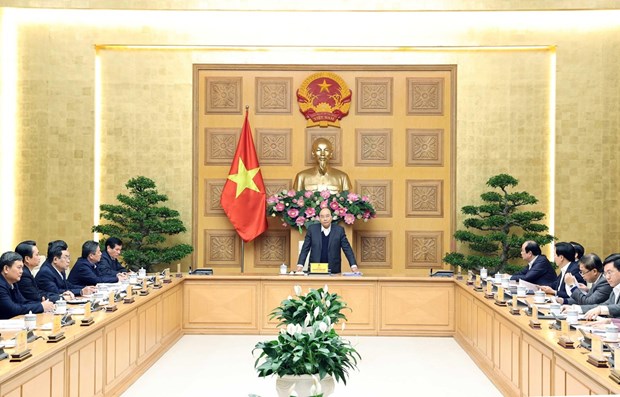 |
|
PM Nguyen Xuan Phuc speaks at the working session with Tra Vinh officials
|
On December 18, meeting with officials of Tra Vinh, a province located in an important position in the eastern coastal region of the Mekong Delta, the Government leader suggested measures to help the province cope with natural disasters and the intrusion of salt water.
He approved the allocation of funding from the central budget reserves to two urgent projects to build anti-erosion dykes in Cau Ke town and dykes along the Hau River to protect local communities from floods and high tides.
Tra Vinh officials reported that the river banks in Cau Ke town are seriously eroded, threatening the life, production and assets of more than 2,000 local households. Meanwhile, more than 5,000 ha of orchards and aquaculture farms along the Hau River have been frequently inundated by floods or high tides, causing great losses to local residents.
PM Phuc also assigned the Ministry of Agriculture and Rural Development to coordinate with relevant agencies and localities to revise irrigation and anti-natural disaster plans for the Mekong Delta with a view to adjusting them to the current situation of droughts and salinity intrusion. Those plans will serve as the basis to work out specific investment plans in the medium and long terms.
The PM also supported the province’s proposal on building the Dai Ngai bridge, and asked ministries and agencies to pay more attention to developing transport in the Mekong Delta.
At a working session with officials of the central province of Thua Thien-Hue, PM Phuc underlined the importance of the Politburo’s Resolution 54/NQ-TW and the Government’s Resolution 83/NQ-CP on the development of the province to 2030 with a vision to 2045, including upgrading Thua Thien-Hue into a centrally-run city.
He asked ministries and central agencies work harder to remove obstacles facing the central province due to outdated institutions and policies. Specific mechanisms are needed to facilitate the development of the province, especially the urban economy.
The PM paid special attention to the land clearance work in the ancient Hue imperial citadel to create space and land fund for the preservation of tangible and intangible values of the ancient capital, towards turning Hue city into a city of festival, a unique cultural tourism hub of Asia.
He voiced approval of Thua Thien-Hue’s proposals regarding measures to remove bottlenecks in its development, and assigned the Ministry of Home Affairs, in coordination with relevant ministries, to urgently finalise projects on adjusting the administrative boundary to expand Hue city, developing Thua Thien-Hue into a centrally-run city, and issuing mechanisms and policies specifically tailored for the locality.
PM Phuc agreed to grant funding from the central budget reserves to the conservation and reparation of two relics facing high degradation risks – Thai Hoa Palace and Thai Mieu temple.
On December 16, the Government leader had a working session with officials of Thai Binh, during which he stressed agriculture is still important to the Red River Delta province.
He told the province to try to attract investment in agriculture, while developing the Thai Binh Economic Zone into a driver for local economic growth.
PM Phuc agreed with the province’s proposal on transport connection, and instructed relevant ministries and agencies to make planning and allocate funding for projects in this field.
He promised to instruct ministries to early complete procedures for the approval of functional zones in the Thai Binh Economic Zone, thus allowing the province to make investment. Thai Binh plans to establish four industrial parks with total area of 2,000 ha in the zone from now to 2025.
The PM also agreed to let the province lead the compilation of a dossier of the traditional art of Cheo singing to seek UNESCO recognition as part of the intangible cultural heritage of humankind./. VNA